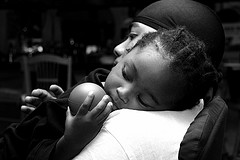
Published in the journal Pediatrics, this is the first study to ascertain the stage where young fathers are at risk of developing this type of depression.
“We know a lot about mothers and maternal depression and the effect that it has on children, and we’re just now starting to learn about paternal depression,” says lead author Dr. Craig Garfield, an associate professor of pediatrics at Northwestern University’s Feinberg School of Medicine in Chicago, to Reuters.
According to WomensHealth.gov, “depression is more than just feeling “blue” or “down in the dumps” for a few days. It’s a serious illness that involves the brain. With depression, sad, anxious or “empty” feelings don’t go away and interfere with day-to-day life and routines. These feelings can be mild to severe.”
Depressive symptoms increased on average by 68 percent over the first five years of fatherhood for young men around the age of 25 years 0ld when they became fathers and lived with their children.
The scientists analyzed surveys of 10,623 males who were enrolled in a long-term health study as teenagers and have been followed for more than 20 years.
A total of 3,425 participants became fathers by the end of the study period. Of those men, 2,739 of them lived with their child and 686 were nonresident fathers.
According to Garfield, depression impacts between 5 and 10 percent of fathers, while anywhere from 10 to 15 percent of women will experience maternal depression after their baby is born.
Thus raising an alarm for mental health screenings to be extended to men and to anyone who knows a young man who recently became a father and to encourage the new dad to get help if he is showing signs of anxiety or loss of interest in the activities he once enjoyed.
Previous research has shown depressed dads will use more corporal punishment, read less and interact less with their children and are more likely to be stressed and neglectful.
S.C. Rhyne is a blogger and novelist in New York City. Follow the author on Twitter @ReporterandGirl, http://Facebook.com/TheReporterandTheGirl and visit her website at http://www.SCRhyne.com


